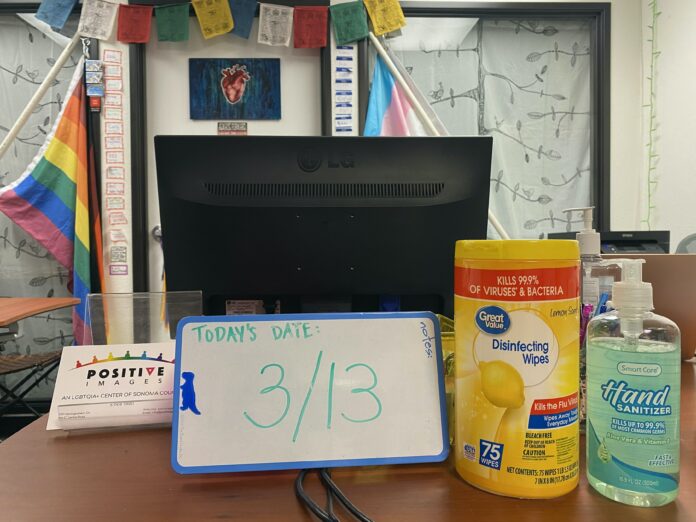For the past three years, I’ve spent Friday evenings co-facilitating Positive Images’ peer support group for queer and transgender adults—most of us in our 20s and 30s.
We last met in-person on March 13, 2020. Since then, our group—like so many others—has moved online. No, we each hop online from our respective bubbles. Most of us from home, but some folks share cramped spaces, so they take a walk, or call from their car for privacy. While it’s difficult to recreate the feeling of in-person connection remotely, no one is phoning it in.
Gary “Buz” Hermes is a gay elder who offers weekly “Aging Gayfully!” classes for LGBTQ+ seniors through Santa Rosa Junior College’s Older Adults Program. He also co-facilitates group discussions for seniors in Sonoma Valley. Like Positive Images’ groups, they also meet online these days.
For LGBTQ+ people—especially those of us living semi-rurally—feeling disconnected from the community is a common challenge.
“Even before the pandemic, many of us who are LGBT elders live alone and are experiencing isolation,” Hermes says. “Taking the time to share our life journeys and our aging challenges with one another builds connection and community.”
Hermes and I talked about some of the learnings and silver linings that have arisen as we round the corner on a year of leading online groups.
One recurring activity in my Positive Images group is “Queer Show & Tell.” Just as we did in childhood, it’s a space to share meaningful objects and stories. This activity, in particular, adapts so well to an online environment. During the first week of sheltering-in-place, I created a list of scavenger hunt prompts: Show us your favorite cooking utensil, something hanging on your wall, your favorite article of clothing, etc.
What people share in these groups is confidential. But I can share that as I scrambled through my small apartment grabbing my best spatula and a pair of iridescent sunglasses, I realized it was the first time I had gotten out of bed that day, and the first time I had laughed.
Of his class, Hermes told me, “Participants certainly miss our greeting hugs and the synergy of an in-person group, but attendance is much more regular because of the convenience of Zoom. I sense a willingness to share at a more personal level when talking in the safety and comfort of one’s home.”
Hermes and I are both thrilled that meeting online has created accessibility for some people who couldn’t join us in-person.
“I am now able to reach those who live too far away to attend in-person classes, as well as those who have mobility and transportation challenges. As a result, the class is more richly diverse,” Hermes says.









